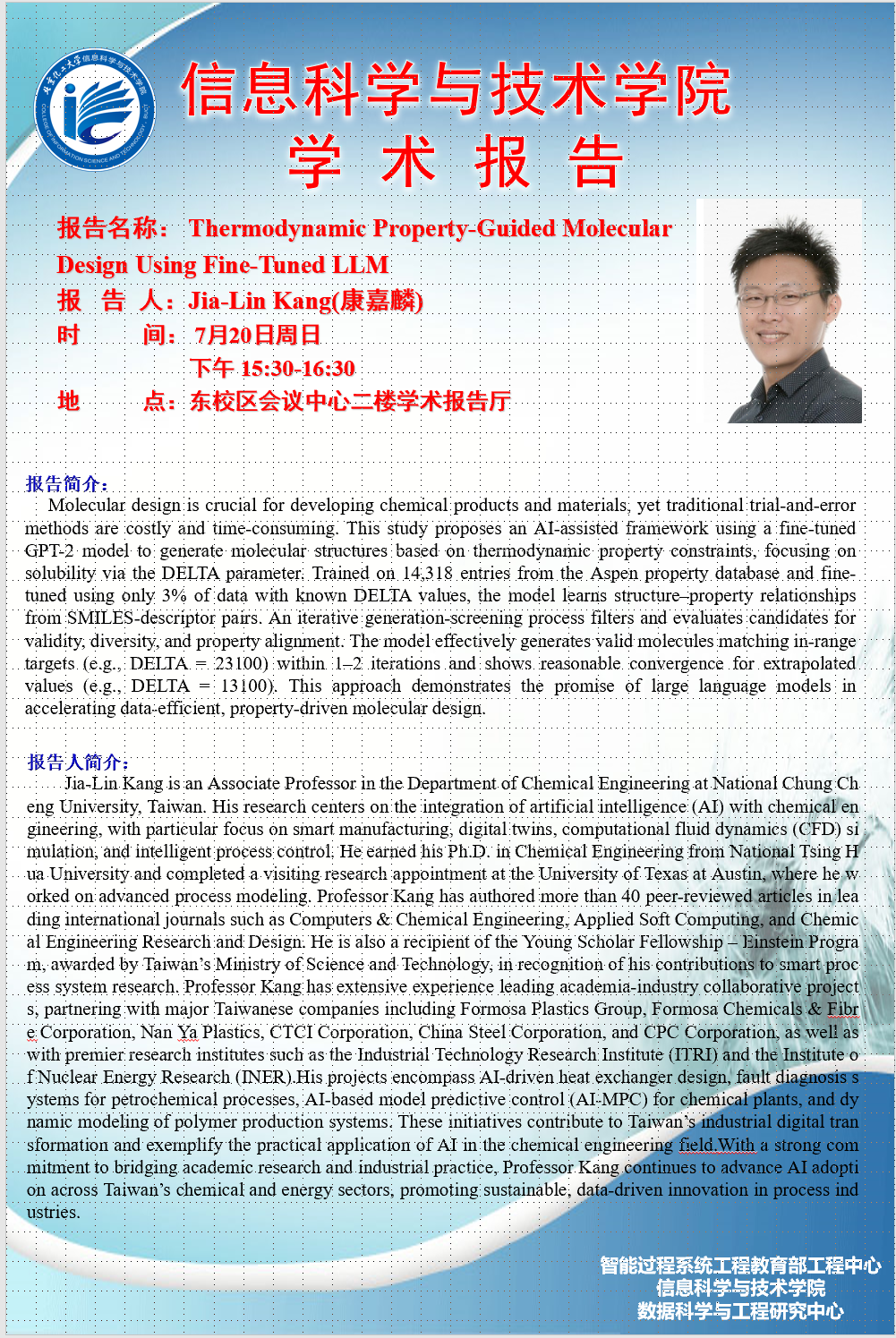报告名称:Thermodynamic Property-Guided Molecular Design Using Fine-Tuned LLM(使用微调LLM的热力学性质指导的分子设计)
报告人:Jia-Lin Kang(康嘉麟)
时间:2025 年7月20日周日 下午 15:30-16:30
地点:东校区会议中心第一会议室
报告简介:
分子设计对于开发化学产品和材料至关重要,但传统的试错方法成本高且耗时。本文提出了一种AI辅助框架,利用经过微调的GPT-2模型,根据热力学性质约束生成分子结构,重点关注通过DELTA参数来调节溶解度。该模型在从Aspen性质数据库中提取的14,318条数据上进行训练,并仅使用已知DELTA值的3%数据进行了微调,从而学习了结构-性质关系,基于SMILES描述符对进行建模。通过迭代生成-筛选过程,模型对候选分子进行有效的筛选与评估,确保其有效性、多样性及性质对齐。该模型能够在1至2次迭代内有效生成与目标范围匹配的有效分子(如DELTA = 23100),并且对于外推值(如DELTA = 13100)具有合理的收敛性。这种方法展示了大语言模型在加速数据高效、性质驱动的分子设计中的潜力。
Molecular design is crucial for developing chemical products and materials, yet traditional trial-and-error methods are costly and time-consuming. This study proposes an AI-assisted framework using a fine-tuned GPT-2 model to generate molecular structures based on thermodynamic property constraints, focusing on solubility via the DELTA parameter. Trained on 14,318 entries from the Aspen property database and fine-tuned using only 3% of data with known DELTA values, the model learns structure–property relationships from SMILES-descriptor pairs. An iterative generation-screening process filters and evaluates candidates for validity, diversity, and property alignment. The model effectively generates valid molecules matching in-range targets (e.g., DELTA = 23100) within 1–2 iterations and shows reasonable convergence for extrapolated values (e.g., DELTA = 13100). This approach demonstrates the promise of large language models in accelerating data-efficient, property-driven molecular design.
报告人简介:
康嘉麟教授是台湾中正大学化学工程系的副教授。他的研究主要集中在人工智能(AI)与化学工程的结合,特别关注智能制造、数字孪生、计算流体力学(CFD)仿真以及智能过程控制。他获得了国立清华大学化学工程博士学位,并曾在德克萨斯大学奥斯汀分校从事访问研究,研究方向为先进过程建模。康教授已在《计算与化学工程》、《应用软计算》和《化学工程研究与设计》等国际领先期刊上发表了40多篇同行评审的文章。他还荣获台湾科技部“青年学者奖-爱因斯坦计划”,以表彰他在智能过程系统研究方面的贡献。康教授在学术与产业合作项目方面积累了丰富的经验,曾与台湾主要企业合作,包括台塑集团、台化公司、南亚塑胶、中华工程公司、中国钢铁公司和中油公司,还与领先的研究机构如工业技术研究院(ITRI)和核能研究所(INER)开展合作。他的项目涵盖了基于AI的热交换器设计、石化过程故障诊断系统、基于AI的化工厂模型预测控制(AI-MPC)以及聚合物生产系统的动态建模等内容。这些研究成果推动了台湾工业的数字化转型,并展示了AI在化学工程领域的实际应用。康教授致力于将学术研究与工业实践结合,推动人工智能在台湾化学与能源领域的应用,促进过程工业中的可持续、数据驱动的创新。
Jia-Lin Kang is an Associate Professor in the Department of Chemical Engineering at National Chung Cheng University, Taiwan. His research centers on the integration of artificial intelligence (AI) with chemical engineering, with particular focus on smart manufacturing, digital twins, computational fluid dynamics (CFD) simulation, and intelligent process control. He earned his Ph.D. in Chemical Engineering from National Tsing Hua University and completed a visiting research appointment at the University of Texas at Austin, where he worked on advanced process modeling. Professor Kang has authored more than 40 peer-reviewed articles in leading international journals such as Computers & Chemical Engineering, Applied Soft Computing, and Chemical Engineering Research and Design. He is also a recipient of the Young Scholar Fellowship – Einstein Program, awarded by Taiwan’s Ministry of Science and Technology, in recognition of his contributions to smart process system research. Professor Kang has extensive experience leading academia-industry collaborative projects, partnering with major Taiwanese companies including Formosa Plastics Group, Formosa Chemicals & Fibre Corporation, Nan Ya Plastics, CTCI Corporation, China Steel Corporation, and CPC Corporation, as well as with premier research institutes such as the Industrial Technology Research Institute (ITRI) and the Institute of Nuclear Energy Research (INER).His projects encompass AI-driven heat exchanger design, fault diagnosis systems for petrochemical processes, AI-based model predictive control (AI-MPC) for chemical plants, and dynamic modeling of polymer production systems. These initiatives contribute to Taiwan’s industrial digital transformation and exemplify the practical application of AI in the chemical engineering field.With a strong commitment to bridging academic research and industrial practice, Professor Kang continues to advance AI adoption across Taiwan’s chemical and energy sectors, promoting sustainable, data-driven innovation in process industries.
